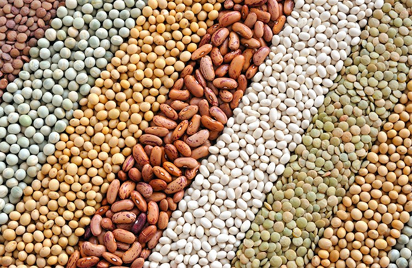
Calls for strict adherence to agro-export procedures
By Gabriel Ewepu – Abuja
The Nigeria Agricultural Quarantine Service, NAQS, Friday, disclosed an effort made to make Nigerian beans acceptable internationally.
This was disclosed in a statement signed by Head, Media, Communications and Strategy, NAQS, Dr Gozie Nwodo, where the Director-General, NAQS, Dr Vincent Isegbe, made it known during the inauguration of members of the Standing Committee on Agro Zero Initiative in Abuja, and Isegbe commended the Minister of Agriculture, Muhammad Nanono, for commitment towards repositioning NAQS to carry out its export control functions at the airports and the seaports, and for reviving the Standing Inter-Ministerial Technical Committee on Agro Zero Reject Initiative.
He also added that with all the relevant stakeholders working concertedly toward the zero reject target, it would not be long before all the causal issues of export reject are tackled.
Isegbe who was concerned with the ban by the European Union, EU, on export of Nigerian dried beans to member countries, explained that NAQS is making everything possible towards lifting the ban.
READ ALSO: NAS tells FG to implement health protection regulations in prisons, military detention cells
Some of the gaps identified in export control that require immediate attention; Poor agricultural practice; occasioned by the indiscriminate and unapproved use of agro-pesticides by the operators of the various produce; The control of agro-pesticides still resides with NAFDAC instead of Federal Ministry of Agriculture and Rural Development, thereby inhibiting a direct link with the end-users; There are no export control measures put in place as required in the EU regulation; Insufficient sensitization on the proper utilization of agro-pesticides to reduce cases of misapplication.
However, NAQS highlighted efforts made to address the issue; Sampling of beans nationwide; at farm level, markets and wholesale store in order to determine the level of pesticide residue in stored beans; Provision of free samples of the “less toxic” agro-pesticides for analysis while working on an alternative bio-degradable agro-pesticides-using pilot states of Kano, Oyo and Benue; Development of a Beans ECVC (Export Certification Value Chain) with the Cowpea/Beans association, on how best to safeguard the Beans value chain; and publications like the Quarantine Bulletin. No. 4 is on ‘Reasons for Rejections of Agro-Exports Commodities, a guide for farmers, exporters and all the value chain operators’.
According to the statement, in 2015, the EU banned the importation of Nigeria’s dried beans, on the ground that the produce contained high level of pesticide considered dangerous to human health.
“Unfortunately, till date, the ban has not been lifted. This is solely as a result of a supposed failure to implement the EU’s food safety action plan submitted since 2018.
“In recent times, several meetings have been held with relevant authorities to address this issue and to provide solutions to this problem.
“As it is mandatory for NAQS, to give every importer or consumer of our agro-produce the public health comfort that the produce is safe and not injurious to human and animal health, from the farm level to the food table and eventually the quarantine export certification desk”, he said.
While acknowledging that Nigeria is the largest producer of dried beans globally, which she accounts for almost half of global production of the commodity, he (Isegbe) said however, Nigeria is not among the top 10 leading exporters of dried cowpea in the world.
He also lamented that factors responsible for Nigeria not being in the top 10 exporters of the commodity include absence of proper gate-keeping to ensure that commodities passed for export meet pesticide residue standards and other phytosanitary requirements.
Others are lack of export quality guarantees, inconsistent pattern of export traffic of the dried beans that annually costs the country $362.5 in foreign revenue annually.
Meanwhile, the NAQS boss also pointed out weak link in the beans value chain, which was export control gap that led to the ban of the commodity by EU, which allowed the shipping of dried beans with pesticide residues higher than the permissible threshold.
According to him the results of the extensive fieldwork and laboratory analyses done by NAQS showed that the challenge of high pesticide residue in Nigerian beans was not nested in the farm. He reported that the bean samples collected from the farms had low pesticide residues –beneath the Maximum Residue Level (MRL) of Nigeria’s trading partners –while bean samples collected from the warehouses had high pesticide residues, above the MRL.
He further stated that “the wide differential indicates that high pesticide use is traceable to the bulk buyers, aggregators, and exporters. In an attempt to protect their stock against weevils and other storage pests, these set of actors usually lace their beans with pesticides liberally; thereby, raising the pesticide residues in the commodity above the MRL and unwittingly rendering them ineligible for export.”
He made it known that NAQS has been on intensive public awareness creation on the dangers of indiscriminate use of pesticides and that stakeholders along the value are being trained on integrated pest management, the proper use of pesticides, and Good Agricultural Practices (GAP) is breaking through to farmers, off-takers, warehouse owners, and exporters in the beans producing belt and across the country.
He also expressed optimism based on the agency’s efforts said with the shift from applying synthetic pesticides to bio-pesticides and organic agriculture among agricultural value chain players, Nigeria will soon take the centre stage of dominating the global cowpea market and other markets where the nation can assert its comparative advantage.
Vanguard News Nigeria
The post EU Ban: NAQS discloses effort to make Nigerian beans acceptable internationally appeared first on Vanguard News.















Advertise your business here at cheap rate and get large audience to your market. Call/Msg Teemikemedia: 07060733664 to get started.